外研版九年级英语下册课件Module 2 Education Unit 3 (共115张PPT)
文档属性
| 名称 | 外研版九年级英语下册课件Module 2 Education Unit 3 (共115张PPT) |

|
|
| 格式 | ppt | ||
| 文件大小 | 2.1MB | ||
| 资源类型 | 教案 | ||
| 版本资源 | 外研版 | ||
| 科目 | 英语 | ||
| 更新时间 | 2022-08-14 00:00:00 | ||
图片预览

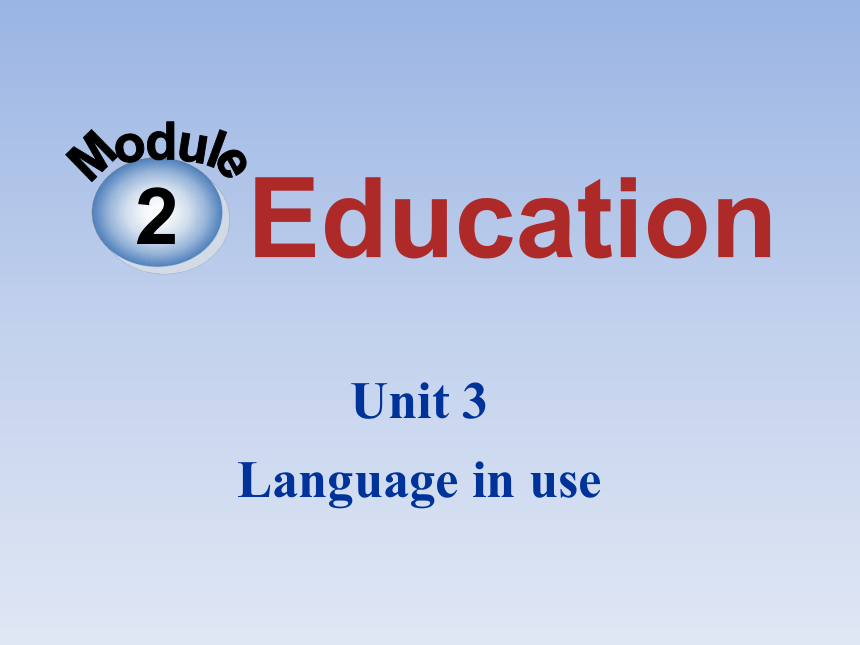

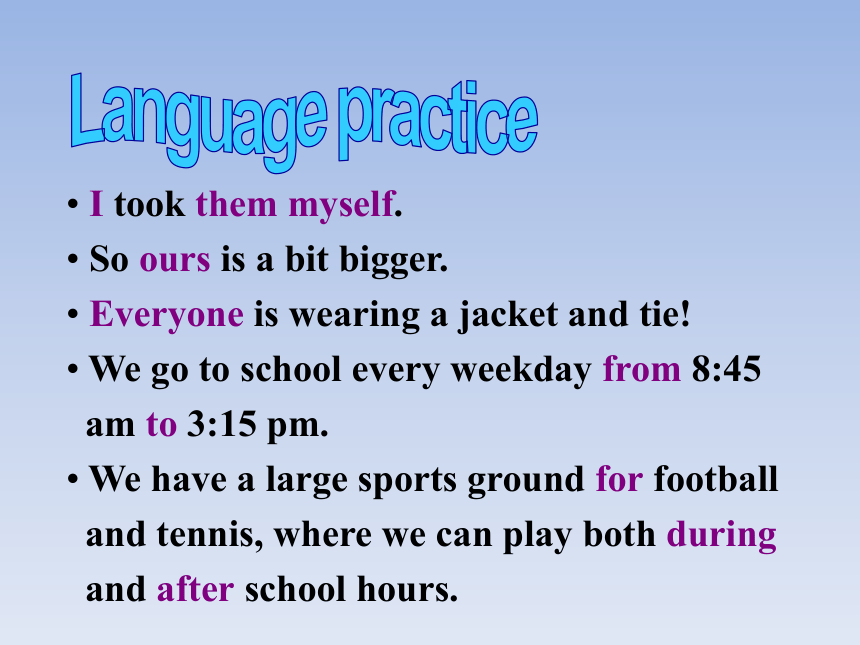

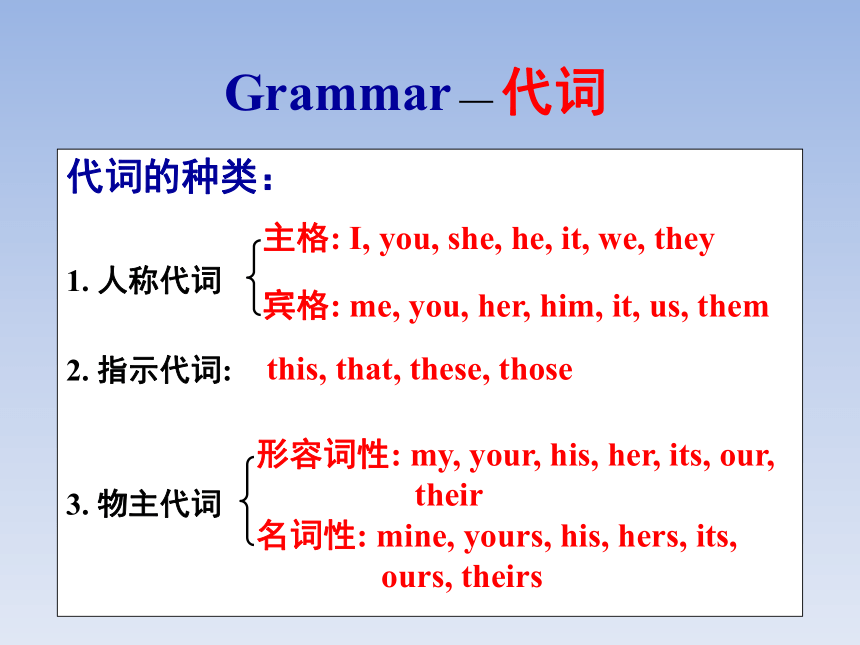
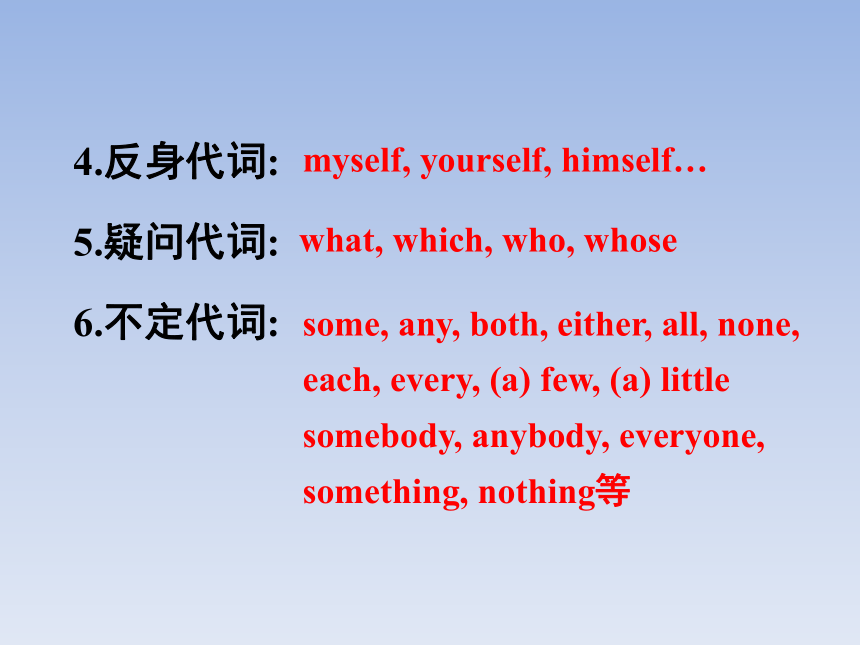
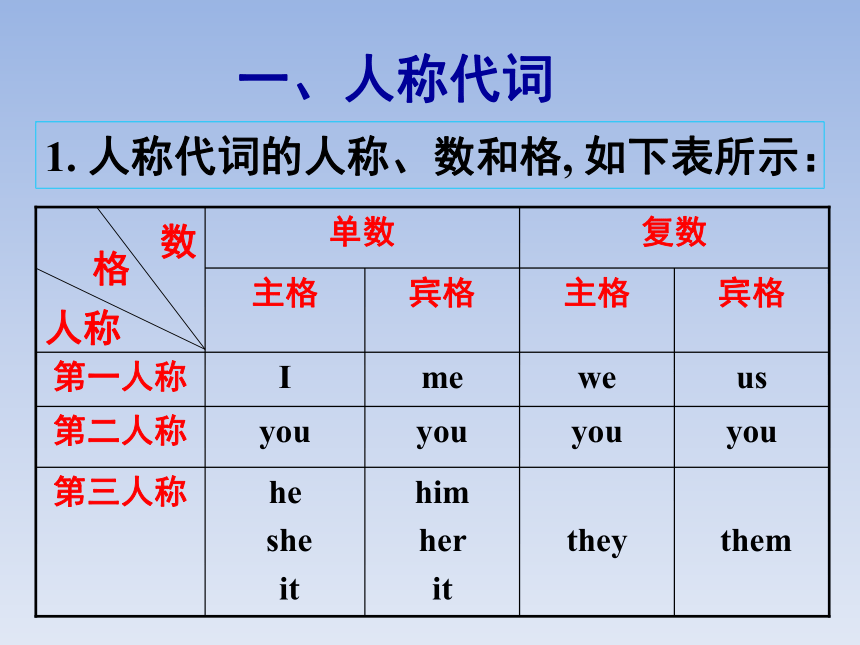
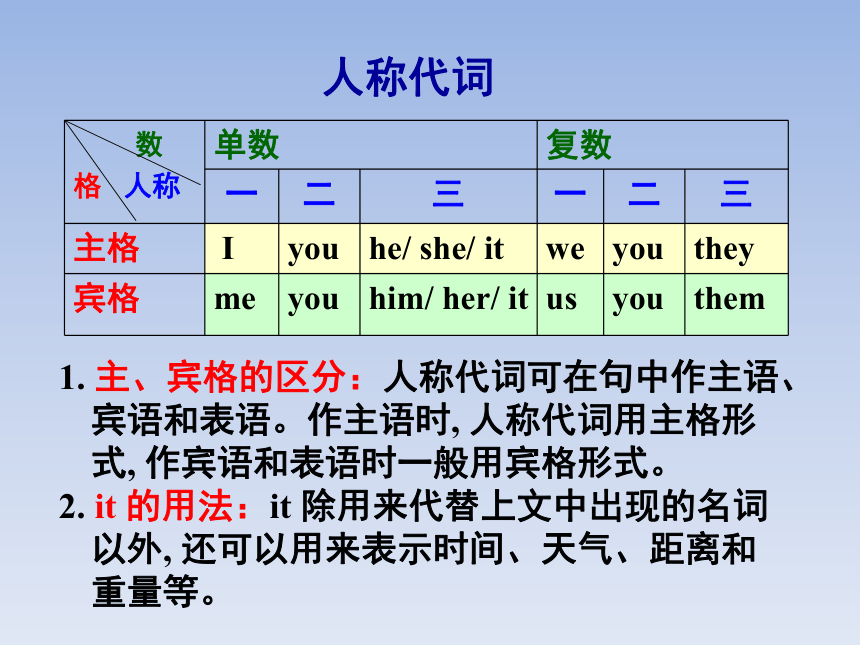
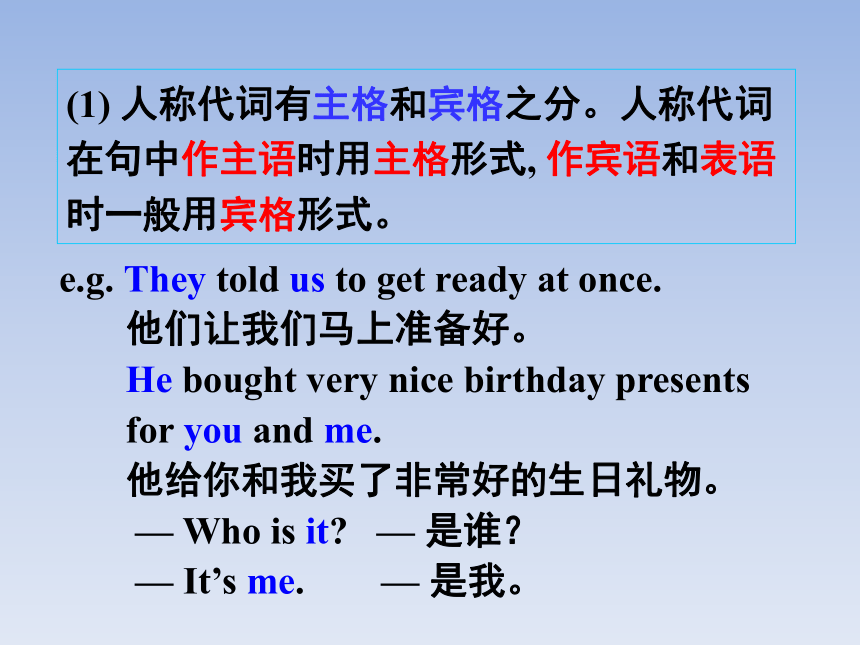
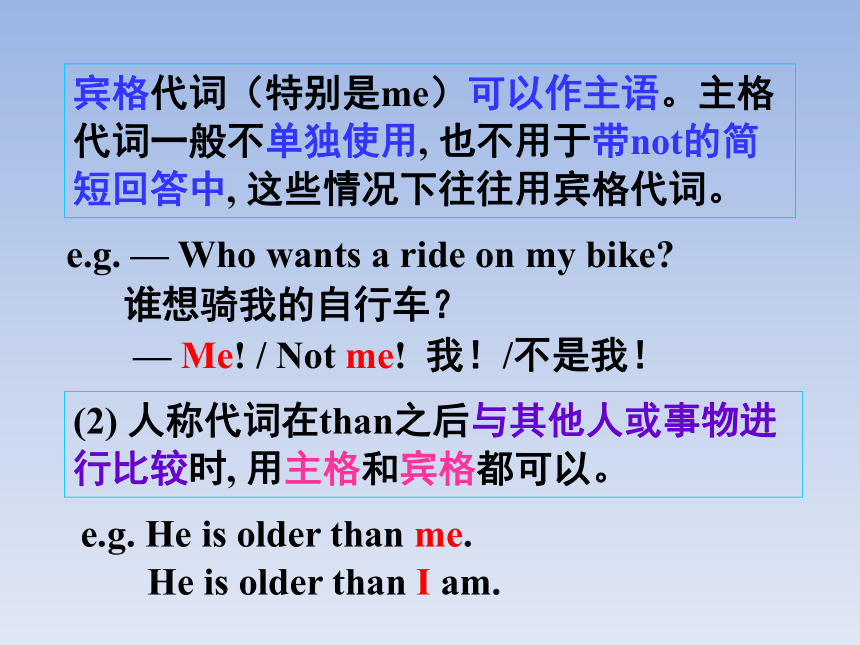
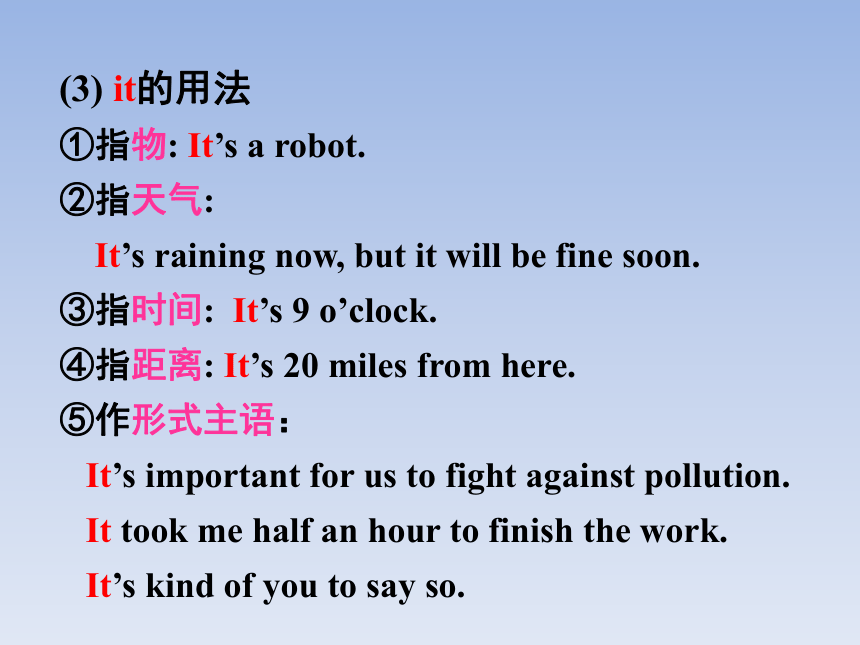
文档简介
(共115张PPT)
2
Unit 3
Language in use
Teaching aims and demands:
Writing skill: Making a timetable for your school day.
To summarize and consolidate the use of pronoun, prepositions and prepositional phrases.
3. Affection and attitudes: we should love our school and form the habit of reading.
I took them myself.
So ours is a bit bigger.
Everyone is wearing a jacket and tie!
We go to school every weekday from 8:45
am to 3:15 pm.
We have a large sports ground for football
and tennis, where we can play both during
and after school hours.
代词;介词与介词短语
Grammar — 代词
代词的种类:
1. 人称代词
2. 指示代词:
3. 物主代词
主格: I, you, she, he, it, we, they
this, that, these, those
形容词性: my, your, his, her, its, our,
their
名词性: mine, yours, his, hers, its,
ours, theirs
宾格: me, you, her, him, it, us, them
4.反身代词:
5.疑问代词:
6.不定代词:
myself, yourself, himself…
what, which, who, whose
some, any, both, either, all, none, each, every, (a) few, (a) little somebody, anybody, everyone, something, nothing等
1. 人称代词的人称、数和格, 如下表所示:
复数
单数
you
you
you
you
第二人称
them
they
him
her
it
he
she
it
第三人称
us
we
me
I
第一人称
宾格
主格
宾格
主格
数
格
人称
一、人称代词
数
格 人称 单数 复数
一 二 三 一 二 三
主格 I you he/ she/ it we you they
宾格 me you him/ her/ it us you them
人称代词
1. 主、宾格的区分:人称代词可在句中作主语、宾语和表语。作主语时, 人称代词用主格形式, 作宾语和表语时一般用宾格形式。
2. it 的用法:it 除用来代替上文中出现的名词以外, 还可以用来表示时间、天气、距离和重量等。
(1) 人称代词有主格和宾格之分。人称代词在句中作主语时用主格形式, 作宾语和表语时一般用宾格形式。
e.g. They told us to get ready at once.
他们让我们马上准备好。
He bought very nice birthday presents
for you and me.
他给你和我买了非常好的生日礼物。
— Who is it — 是谁?
— It’s me. — 是我。
(2) 人称代词在than之后与其他人或事物进
行比较时, 用主格和宾格都可以。
e.g. He is older than me.
He is older than I am.
宾格代词(特别是me)可以作主语。主格代词一般不单独使用, 也不用于带not的简短回答中, 这些情况下往往用宾格代词。
e.g. — Who wants a ride on my bike
谁想骑我的自行车?
— Me! / Not me! 我!/不是我!
(3) it的用法
①指物: It’s a robot.
②指天气:
It’s raining now, but it will be fine soon.
③指时间: It’s 9 o’clock.
④指距离: It’s 20 miles from here.
⑤作形式主语:
It’s important for us to fight against pollution.
It took me half an hour to finish the work.
It’s kind of you to say so.
⑥作形式宾语:
We think it necessary to relax from time to
time.
(4) 人称代词的顺序:
当多个人称代词并用时, 英语中人称代词的排列顺序与汉语不同。汉语中喜欢说“你、我、他”, 而英语中通常要说you, he/she and I, 复数人称代词的排列顺序是we, you and they。
二、指示代词
指示代词在句中可作:
1) 主语
e.g. These are our children.
2) 宾语或介词宾语
e.g. Tom gave me this.
3) 偶尔用作表语
e.g. What I want to stress is this.
指示代词有下面四个:
this that these those
(1) this和these一般用来指在时间或空间上
较近的事物或人, that和those则指时间和空
间上较远的事物或人。
e.g. This is a pen and that is a pencil.
We are busy these days.
In those days the workers had a hard time.
—What’s this (that)
—It’s a book.
—What are these (those)
—They are books.
(2) 有时that和those指前面讲到过的事物, this 和 these则是指下面将要讲到的事物。
e.g. I had a cold. That’s why I didn’t come.
What I want to say is this: pronunciation
is very important in learning English.
e.g. Hello! This is Mary. Is that Jack speaking?
(4) this在电话用语中代表自己, that则代表对方。
e.g. Television sets made in China are just as
good as those made in Japan.
(3) 有时为了避免重复提到的名词, 常可用that或those代替。
人称 形容词性物主代词 名词性物主代词
单数 第一人称 my mine
第二人称 your yours
第三人称 his his
her hers
its its
复数 第一人称 our ours
第二人称 your yours
第三人称 their theirs
三、物主代词
类别
人称
数
e.g. This is my (形容词性物主代词) book.
= This book is mine. (名词性物主代词)
His is the newest dictionary in our class.
他的字典是我们班最新的。
物主代词包括形容词性物主代词和名词性物主代词。名词性物主代词从意思上讲相当于“形容词性物主代词+名词”, 其作用与名词相同。
四、反身代词
反身代词主要有下面这些:
单数 myself yourself himself herself itself
复数 ourselves yourselves themselves
1. 反身代词常在句中作宾语和同位语。
e.g. Let me introduce myself. (宾语)
Mary herself opened the door. (同位语)
2. 反身代词也可作介词宾语。
e.g. Take good care of yourself.
1. 作宾语
Help yourself to some cakes.
I can look at myself in the mirror.
She is too weak to take care of herself.
May I introduce myself
2. 作同位语(加强语气)
I myself go to the airport to meet my uncle.
You must do it yourself.
You should ask the teacher himself.
反身代词可在句中作宾语和同位语(起加强语气的作用)。
by oneself 亲自
call oneself 自称
lose oneself 迷路
teach oneself 自学
enjoy oneself 过得快乐
help oneself to 随便吃/用
devote oneself to 献身于
dress oneself 自己穿衣服
speak to oneself 自言自语
常见的含有反身代词的短语:
五、疑问代词
疑问代词有下面这些:
who whom whose what which
1. who 在句中多用作主语或表语。
2. whom 在句中用作宾语或介词的宾语。
3. whose 表示 “谁的”,可用作定语、主语、表
语及宾语。
4. what 和 which 都可在句中用作主语、宾语
或介词的宾语以及定语。what 还可用作表语。
疑问代词有who, whom, whose, what和which等疑问代词用于特殊疑问句中,一般放在句首,可以作主语、表语、定语和宾语等。
Who called you right now (作主语)
What is this (作表语)
Whose umbrella is this (作定语)
Whom are you waiting for (作宾语)
Which is yours (作主语)
Which do you want (作宾语)
some & any
1. 不定代词 some 和 any 可以代替名词和形
容词,可在句中作主语、宾语、定语等。
some常用在肯定句中; any常用在否定句
或疑问句中。
作定语时,some 可修饰可数名词(单、
复数皆可)和不可数名词;any 可修饰可数
名词(多为复数)和不可数名词。
2. 不定代词 any有时也可以用在肯定句中,
表示“任何的”。
六、常用的不定代词
all & both
相同点:
1. 两个词都可以指代人和物。
2. 两个词都具有名词性质和形容词性质。
3. 两个词在句子中都可以充当主语、宾语、
定语和同位语。
4. 两个词都可以与 of 连用。
异同点:
both 只能指可数名词,表示两者。
all 既可指可数名词,又可指不可数名词。在
指不可数名词时,表示三者或三者以上。
every & each
相同点:
1. 两个词都具有形容词性质,都可以用作定
语,表示“每一个”。
2. 两个词作主语的定语时,谓语动词都用单数。
异同点:
1. each 除了具有形容词性质之外,还具有名词
性质,而every没有名词性质,因此 each 可
以与 of 搭配,而every不能。如:
each of the children (√)
every of the children (×)
2. each强调个体,而every 强调整体。
both, either & neither
相同点:
1. 三个词都表示两者。
2. 三个词在句中都可以作主语、宾语和定语。
异同点:
1. 三个词的含义不同:
both 表示“两者都……”;
either表示“两者中随便哪个都……”;
neither表示“两者中哪个都不……”。
2. 三个词各自构成不同的固定短语:
both … and … 表示“两者都……”
either … or … 表示“要么……要么……”
neither … nor … 表示“既不……也不……”
e.g. Both Beijing and Shanghai are big cities.
北京和上海都是大城市。
Either this knife or that one will do.
这把或那把小刀都行。
The weather here is neither too hot nor too cold.
这儿的天气既不太热也不太冷。
3. both…and…结构作主语时,谓语动词用复
数;either…or…与 neither…nor… 结构作主
语时,谓语动词的数由离其最近的名词决定。
e.g. Either that watch or these watches are made in
Hong Kong.
Neither my parents nor my sister likes tennis.
修饰可数名词 修饰不可数名词
表示否定含义 few little
表示肯定含义 a few a little
little, a little & few, a few
1. a (little) 用于不可数名词,a (few) 用于可数
名词。
2. a little 和 a few 表示肯定的概念,而little和
few表示否定的概念。
如下表:
Grammar — 介词和介词短语
介词(Prepositions)是一种用来表示词与词, 词与句之间的关系的词。在句中不能单独作句子成分,必须以介词短语的形式来构成句子成分。“介词 + 名词”构成的介词短语在句中作状语,表语,定语 等。
I. 定义:
II. 分类:简单介词和复杂介词
1. 简单介词:
as, at, but, by, down, for, from, in, like, of,
off, on, out, past, per, round, since, than,
through, till, to, up, with, about, above,
across, after, against, along, among, around,
before, below, behind, beneath, beside,
besides, between, beyond, despite, during,
except, inside, into, onto, opposite, outside,
over, unlike, until, upon, within, without;
2. 复杂介词:
(1)两个词 :副词/形容词/连词+介词
as for, except for, but for
apart from, away from, aside from, as from,
ahead of, back of, because of, instead of,
out of, outside of, regardless of,
according to, as to, close to, contrary to, due
to, near (er) to, next to, on to, owing to,
thanks to, up to;
along with, together with;
(2) 三个词 介词1+名词+介词2
in view of the election
In terms of money, her boss was small.
Two men were interviewed at the police station
in connection with a theft from an Oxford Street
store.
How many delegates are in favor of this motion
比较: in the light of the election
as a result of
① in+名词+of :
in charge of ; in case of; in (the) face of ;
in front of; in place of; in need of; in favor of;
in the light of; in respect of; in spite of;
in view of;
② in+名词+with:in common with; in line with;
in comparison with;
in contact with;
③ by+名词+of :by means of; by way of;
④ on+名词+of:
on account of; on behalf of; on the grounds of;
on the matter of; on (the) top of; on the part of;
on the strength of;
⑤ 其他类型:
as far as; at the expense of; at the hands of;
for (the) sake of ; in exchange for; in return for;
in addition to; in relation to; with/in regard of;
with/in respect to; with the exception of;
(3) 有些以of结尾的复杂介词可用属格形式
替代:
for the sake of the people
= for the people’s sake;
on behalf of Jim
= on Jim’s behalf
at the expense of Susan
= at Susan’s expense
III. 用法
介词短语作状语
e.g. The space pen worked in space, under
water, even on ice.
太空笔可以在太空中、水下,甚至冰
上使用。
He wrote long poems for children.
他给孩子们写长诗。
(2) 介词短语作定语
e.g. He seems to know the solution to the
problem.
他似乎知道这问题的解决办法。
We had a debate about women’s lives
now and in the past.
我们就妇女现在与过去的生活状况展
开了一场辩论。
(3) 介词短语作表语
e.g. Tom and Jack are from England.
汤姆和杰克来自英格兰。
Our manager is on holiday in the
south. 我们经理正在南方度假。
许多介词短语已经成为固定表达方式,我们可
以把它们作为一个整体来记忆和使用, 如 in
the past, in the morning, at the weekend, after
school 等。
IV.介词的兼词现象
有些单词既可以用作连词也可以用作介词,而有些单词既可以用作介词又可以用作副词,应注意区分它们在句子中的不同功能。
试比较:
when she arrived
of her arrival
the day
注:辨别两种词类的一个标准是:介词引导的是名词性或名词化补足语,而与之相对的从属连词引导一个从属分句(从句)。
(1) after 和 before
after和before两词既可以作连词,也可以作
介词。作连词时后面接从句,作介词时后面
接名词或动词的-ing形式。
e.g. What did you do after you called the police
报警之后,你做了些什么?
(after 为连词,连接状语从句)
I am going to the playground to play
basketball after school. 课后我要去操场打
篮球。 (after为介词,与名词school构成介
词短语作状语)
试比较下面两句话:
You should take off your shoes before you
go into a Japanese home.
You should take off your shoes before going
into a Japanese home.
以上两句意思相同,都表示“去拜访日本家
庭的时候,入室前要脱鞋”,但是第一句中
before为连词,而第二句中before为介词。
(2) above 和 below
above和below可以作介词, 也可以作副词。
e.g. Do not write below the line. 请勿写在线下。
(below和the line构成介词短语作状语)
Please write to me at the address below.
请按照下面的地址给我写信。
(below为副词)
英语中兼作介词和副词的单词很多, 如about,
behind, down, up, in, off, on, over, through,
under 等。
V. 常见介词及用法
表示时间
表示场所
表示方向
表示方式、手段
表示材料
其他
at, in, on, before, after, by, until, till, for, during, through, from, since…
at, in, on, under, by, near, between, around…
of, from, in…
of, from, as…
by, with, on…
into, out of, along, across…
1. 表示年、月、日、时刻等用at, in, on
2. 表示时间的前后用before, after
3. 表示期限等用by, until, till
4. 表示期间等用for, during, through
5. 表示时间的起点等用from, since
6. 表示时间的经过等用in, within
at lunch 午餐时 at breakfast早餐时
at night 在夜间 at first 起初
at times 偶尔, 有时 at the same time同时
We usually have lunch at noon/at twelve.
我们通常中午吃午饭(十二点吃午饭)。
at & on & in
at用于表示时刻、时间的某一点。
注意:表示时间的名词前有this, last, next, every 等修饰时, 其前面不加介词。
this morning 今天早上
last Monday 上周一
every week 每周
on Monday 在周一 on June 6 在6月6日
on Tuesday morning 在周二早上
on May 4, 2003 在2003年5月4日
on Christmas Day 在圣诞节那天
We didn’t listen to the lecture on Wednesday
afternoon.
周三下午我们没去听演讲。
on用于表示某天,某一天的上、下午(指具体的某一时,一律用on)
in the week 在这周 in May 在五月
in the holiday 在假期中 in summer 在夏季
in September, 1995 在1995年9月
in the morning 在上午
in the 21st century 在二十一世纪
in time 及时 in an hour 一个小时后
Do they work in the day time or at night
in用于表示周、月、季节、年和泛指的上午、下午、晚上(指在一段时间内)
A. before 在……之前
e.g. Wash your hands before dinner.
(before作介词) 吃饭前请洗手。
He will call me before he leaves here
/before ten o’clock. (前一个before作连词;
后一个before作介词)
他离开这儿之前/十点之前, 将给我打电话。
before & after
两者既可以作介词又可以作连词。
B. after 在……之后
e.g. Let’s sing some songs after school.
(after作介词) 放学后咱们唱歌吧!
Please close the door after you leave
the room.
(after作连词) 离开房间后请关门。
A. by 在……前(时间);截止(到)……
by the end of… 在……底(之前)
by then 到那时
by the time + 从句 在……之前
How many English books had you read by
the end of last year
到去年年底以前你看过多少本英文书?
She had left by the time I arrived.
我到时(之前)她已经走了。
by & until/till
B. until/till 直到……为止(时间)
e.g. We didn’t begin to watch TV until/till
nine o’clock.
一直到九点, 我们才开始看电视。
I will wait for him until he comes here.
我将在这儿一直等到他来。
for 达……之久(表示经过了多少时间)
可以和一般现在时、过去时、将来时连
用, 但经常和完成时连用。
e.g. He has lived here for 20 years.
他在这儿已经住了二十年了。
We will stay in the city for two days.
我们要在这座城市待两天。
for & during & through
B. during 在……期间
e.g. They are going to have a good rest during
the summer holidays.
暑假中他们打算好好休息一下。
C. through 一直……(从开始到结束)
e.g. They played the cards through the night.
He stayed in London through the winter.
比较:for和during。for之后大多跟表示
时间、具体天数等的数字名词; 而during
后决不能跟表数字的名词。
from 从……起(时间)
表示“从……开始”时, 一般都是用词组
from…to…, 而单纯表示确切的“从几点
开始”时用at。
e.g. The meeting will be held from eight to ten.
这个会议将从8点开到10点。
The meeting will be held at eight.
会议将从八点钟开始。
from & since
B. since 自从……以来 (表示从以前某时一
直到现在仍在继续)
e.g. I have been sick since yesterday.
我从昨天起就病了。(强调一直病到现在)
The doctor has saved a lot of lives since he
became a doctor.
(since作连词, 引导时间状语从句)
这个医生自从当医生以来已经拯救了许多
人的生命。
in过……后(未来时间), 大多用在将来时
(一般将来时和过去将来时)
in an hour 一小时之后
in a week or so 大约一星期之后
He will be back in five hours.
他五小时之后回来。
注意:如果用于过去式, 用after+时间。
She went to Nanjing last May, and she
came back after a month.
in & within
B. within 不超过……的范围
within 3 hours 3小时之内
within a week 一周之内
I must finish painting the cat within five
minutes.
我必须在五分钟之内画好这只猫。
比较:within和in。within强调“在……
时间之内”,没有时态的限制。in是以限制
为基础,in an hour是指从现在起一个小
时之后,所以in一般只用于将来时。
表示场所的介词
表示方向的介词
at, in, on, under, by, near, between, around, opposite
into, out of, along, across, through, up, past
at在某地(表示比较狭窄的场所)
at school 上学 at home 在家
at Baker Street 在贝克街
stand at the door 站在门边
at the bottom/back/end/head of
I’ll meet him at the Beijing railway station.
我将去北京站接他。
at & in
B. in 在某地(表示比较宽敞的场所)
in Beijing 在北京 in the world在世界上
in the bed 躺在床上 in China 在中国
in a book/newspaper 在书上/报纸上
His brother is in prison. He was arrested 2
years ago.
Mike works in the prison.
She was born in China.
on 在……上面,有接触面。
on the desk 在桌子上面
on the map 在地图上
There are two maps on the wall.
墙上有两张地图。
on 在……靠近……的地方
on the right 在右边 on the river在河边
on the pavement 在人行道上
on & above & over & under & below
B. above 在……上方
e.g. Our plane flew above the clouds.
我们的飞机在云端上飞行。
C. over 在……正上方,是under的反义词
e.g. There is a light over Li Ming.
李明的正上方有一盏灯。
A few birds were flying over the sea.
有几只鸟在海上飞。
D. under 在……下面
under the table 在桌子下面
under the jacket 在夹克下面
The dog is under the table.
这只狗在桌子下面。
C. below 在……下方(不一定是正下方)
正下方是under,below是above的反义词。
e.g. There are a lot of fishes below the surface
of the water. 水下面有许多各式各样的鱼。
near近的,不远的
near=not far,是far的反义词。
near还可以指时间,如:
in the near future 在不久的将来
Is there a bus stop near here
这儿附近有公共汽车站吗?
B. by 在……旁边,距离比near要近
by the window 在窗户边 by me在我旁边
The boy is standing by the window.
near & by
between 在两者之间
e.g. My teacher is sitting between Tom and
Mike. 我们的老师正坐在汤姆和麦克之间。
What’s the difference between A and B?
B. among 在三者或更多的之中
e.g. There is a beautiful house among the trees.
在树林之中有一间漂亮的房子。
He is very popular among the students.
他在学生之中很受欢迎。
between & among & around
C. around 环绕,在……周围,在……四周
e.g. We sat around the table.
我们在桌子四周坐下来。
The earth moves around the sun.
地球围绕太阳转。
in (the) front of 在……的前面(前部)
e.g. There is a tree in front of the house.
在房屋前面有一棵树。
There is a big desk for the teacher in the
front of the classroom.
在教室前部有一张大讲桌。
B. behind 在……后面
behind是in front of 的反义词
e.g. There is a tree behind my house.
我家房子后面有一棵树。
in front of & behind & opposite
C. opposite 在……对面
e.g. Our school is opposite a university.
我们学校在一所大学的对面。
He stood opposite me.
他站在我对面。
in 在……之内,用于表示静止的位置
e.g. The students are in the classroom.
学生们在教室里。
B. into 进入
用于表示有特定终点的运动的方向。通常
用于表示动作的动词之后。如:go, come,
walk, run等。
e.g. The students run into the classroom.
学生们跑进教室。
He jumped into the water. 他跳入水中。
in & into & out of & up
C. out of和into一样,也表示有一定的运
动方向
e.g. The students rushed out of the room.
学生们冲出房间。
D. up 移动
e.g. The children climbed up the tree.
孩子们爬上了树。
along 沿着
e.g. I was walking along the river when it
began to rain.
我正沿着河边散步,突然下起雨来了。
B. across 横过
e.g. I often swim across the river.
我常游泳横渡这条河。
along & across & past & through
C. past 经过
e.g. Every day he runs past the city hall.
他每天跑步经过市政府。
D. through 贯穿,通过
e.g. The sun shone through the clouds.
阳光穿过云层照射下来。
The river was through the city.
这条河穿过这个城市。
to 到达……地点(目的地)或方向
e.g. He came to Japan in 1980.
B. for 表示目的地,“向……”
for表目的时,一般都是和固定动词搭配。
leave for 动身去…… start for 出发去……
I will leave for America next week.
下周我将动身去美国。
C. from 从……地点起
e.g. It’s about ten minutes’ walk from here to
the cinema.
to & from & for
by用某种方式,多用于交通,如:
by bus 乘公共汽车
by e-mail 通过电子邮件
I went there by bus/in a bus.
我是坐公共汽车去的那儿。
注意:表示搭乘交通工具时,用by时不用冠词,用in时要用冠词。请比较:
He broke the window with a stone.
他用石头把玻璃砸坏了。
注意: with表示用某种工具时,必须用冠
词或物主代词。
They talked on the telephone.
他们通过电话交谈。
She learns English on the radio/on TV.
她通过收音机/电视学英语。
with 表示“用某种工具”。如:
on 表示“以……方式”,多用于固定词组
This box is made of paper.
这个盒子是用纸做成的。
Wine is made from grapes.
葡萄酒是葡萄酿成的。
2. from 成品已看不出原料。如:
1. of 成品仍可看出原料。如:
3. in表示用某种材料或语言。如:
Please fill in the form in pencil first.
请先用铅笔填写这个表格。
They talk in English.
他们用英语交谈。
in指用材料,不用冠词;而with指用工具,要用冠词。请比较:
draw in pencil /draw with a pencil
1. of (属于)……的;表示……的数量或种类
e.g. I’m from Nanjing.
I have got a letter from my friend.
2. from 来自(某地、某人);以……起始(时
间或地点)
e.g. This is a map of China.
Will you please give me a cup of tea
3. as
He dressed as a policeman.
I found a job as a guide.
As a child , she was sent to abroad.
1) as 表示好像。如:
2) 表示作为,当作。如:
3)当某人是某身份时。如:
Anna: Hi, Bob. How did your exams go last term
Bob: Great! I got good marks in (1) both / each
maths and geography. What about you
Anna: I did really well in English. That’s (2)
anything / something I’ve always enjoyed.
My grades in history and art weren’t so
good, because (3) none / neither of those
is my favourite subject. What will you
study this term
Underline the correct words.
Bob: I’ve still got (4) a few / few days before I
have to decide. I’m going to speak to (5)
both / all my teachers and ask for their
advice.
Anna: The teachers say that we must decide for
(6) themselves / ourselves and that (7)
none/neither of them can tell us what to do.
Bob: But I have to get (8) some / any information
because there are so (9) much / many
subjects and it’s very hard to choose.
2. Complete the passage with the words and expression in the box.
both each other His mine myself
A good teacher is someone who is helpful and kind, like my history teacher, Mr Miller.
(1)_____ knowledge of the subject is excellent. Because of him, I love history and even read history books by (2)_______ after the lessons.
His
myself
A friend of (3) ______ called Mark also loves this subject and sometimes we lend (4)__________ books or DVDs about history. I like reading (5) ______ Western and Chinese history books, but I think Chinese history is my favourite subject.
both each other His mine myself
mine
each other
both
3. Complete the sentences with the correct form of the words in the box.
he her him himself our she
their themselves they us we
John’s homework is too difficult. ____ is not able to do it _______, so I’m going to help _____ with it.
2. Some people do not have time to wash ______ pets ___________, so _____ pay someone to do it at the pet shop.
He
himself
him
their
themselves
they
3. — Jane is doing a project about family
history. _____ has asked us to give _____
some of _____ photos that were taken when
we were young. Have _____ got any, Becky
— Yes, there is a photo of ____ with all
the children in our family.
he her him himself our she
their themselves they us we
She
her
our
we
us
4. Complete the passage with the words in the box. You need to use one word more than once.
at for in on
The school cinema shows lots of foreign films. Next week (1)___ Friday and Sunday it is showing a French film called Never Say Goodbye. The story is set (2)___ Paris (3)___ the 1960s. The film lasts two hours and
on
in
in
fifteen minutes and starts (4)___ 6:30 and 9:30 (5)___the evenings. Tickets are 5, but there is a special half-price ticket (6)____ students from our school. Please bring your student card if you want a cheap ticket.
at for in on
at
in
for
5. Complete the sentences so they are true for you.
I study _______ subjects: English,
__________________________________
________.
2. I don’t study ____________________.
3. I take exams in ___________________
____________________________, but I don’t take exams in _________.
six
maths, physics, chemistry,
geography,
music.
biology and PE
maths, physics,
English, chemistry and history
music
4. My favourite sport is _________ because
_______________________.
5. I usually play sports on_______________.
6. After-school activities, such as_________
___________ are very popular at our
school.
football
it is very interesting
Saturdays
and sports
dancing
6. Listen and answer the quesstions.
Where does Kate want to go on holiday
next year
2. What game has Pete played since primary
school
3. When do Kate and Pete have sports practice
Kate wants to go to Germany on holiday
next year.
Pete has played chess since primary school.
Kate and Pete have sports practice on
Wednesday afternoons.
7. Listen again and complete the table.
School year Special subject Club Sport Plan for next year
Kate
Pete
Year 9
Year 10
German
Geography
language
club
language
club;
chess club
holiday in
Germany
win all
my chess
matches
tennis
football
8. Read the passage and say where you
think it comes from.
A dictionary.
b) A school website.
c) A storybook.
1 The schoolday begins at 9 am. Class teachers meet the class and check who is present or absent at the start of the day. All the classes meet once a week on Fridays. The head teacher speaks to the whole school. Morning lessons begin at 9:20 am. There
are three forty-minute lessons, with a twenty-minute break in between. The lunch break is from 12 pm to 1 pm. Afternoon lessons begin at 1 pm and the schoolday finishes at 3 pm.
2 All the students study and take exams in maths, science and English. They also choose one subject from history, geography, art, French and Chinese. All the students take PE lessons, but no exams are required.
3 The chess, music, language and theatre clubs often have meetings after school. Students may join as many clubs as they like, but they must join at least one.
4 After-school sports practice and matches take place on Wednesday afternoons and Saturday mornings. The school has a good record in sports. Last year, we were the best
in football and tennis, and some students
won prizes for swimming and running.
Now match the headings with the
paragraphs.
a) Clubs □ b) School hours □
c) Sports □ d) Subjects □
1
2
3
4
9. Read the passage again and check (√) the true sentences.
The head teacher speaks to the whole
school on Fridays. □
2. The lunch break is less than one hour. □
3. Students take exams in all the subjects
they study. □
4. Students can join more than one club. □
√
√
When it comes to learning, the environment has a big part to play. This has been shown in a long-term study by Professor Mitra from India. He set up
No teachers needed
computers in a village in India where children could not speak English. They did not know what a computer looked like or what the Internet was. To everyone’s surprise, children taught themselves how to use the machines in a very short period of time. This suggests that children can learn fast with little help. Professor Mitra thinks this could change schools. He is now working
on so-called SOLEs (Self-organised Learning Environments). He explains that SOLEs include at least a computer and a bench big enough for four pupils. SOLEs have also been tested in some other countries such as the UK and Italy, with encouraging results.
Making a leaflet about your school
Write sentences about the facts.
There are… students and... teachers in our
school. Students can study…
After school, there are… and…
10. Work in pairs. Discuss and write
sentences about your school.
11. Make a leaflet about your school for new students.
Make a leaflet to introduce your school to
new students. Use the sentences in Activity
10.
Draw pictures and make designs where
necessary.
Write sentences about your opinions.
The thing I like best about our school is…
because…
1. —Is this ______ bike
—No, it’s Lily’s. ______ is over there.
A. your; My B. your; Mine
C. yours; Mine D. yours; My
单项选择—代词。
2. In our school, ____ students like English, but ____of them can speak English smoothly.
A. a little; a few B. a few; few
C. a few, little D. a little; few
3. —Which of the two magazines will you take
—I’ll take ______ though I find ______ of
them are very useful to me.
A. all; both B. either; either
C. either; neither D. either; both
4. —Susan, go and join your sister in cleaning
the yard.
—Why ______ John is sitting there doing
nothing at all.
A. I B. me C. myself D. mine
5. —This book on idioms is interesting. I’d like
______, where did you buy it, Simon
—In the Amazon Bookstore.
A. it B. this C. that D. one
6. We have friends to help us fight against pollution, and trees are one of ________.
A. themselves B. they
C. their D. them
7. _______of us wants to go to the park today, because we have to finish so much homework.
A. Either B. Both C. Neither
8. My sister is old enough to dress ______ now.
A. himself B. herself C. myself
9. Do you have toys I’d like to buy ______ for my cousin.
A. it B. one C. this D. that
10. We must protect plants. They are friends of
______.
A. we B. us C. our D. ours
11. Aunt Tina will visit us soon. ___ is arriving
tomorrow morning.
A. He B. She C. His D. Her
12. You can take _____ of the two toy cars and leave the other for your brother.
A. both B. none C. either D. neither
13. Help ____ to some fish, Jeff.
A. you B. your C. yours D. yourself
14. At present, children mean _______ to most
parents in China.
A. everything B. nothing
C. anything D. something
15. It’s possible to get $100 a day in this company, and some days you can get _____.
A. much B. more C. little D. fewer
—How can we protect ourselves _______
the earthquake
—We should stay calm first。
A. with B. about C. for D. from
2. We’ll play basketball _______ Class 3 tomorrow.
A. over B. against C. to D. for
单项选择—介词。
3. —A person’s life is like a road ______ lots of
difficulties.
—Yes, so we need positive energy.
A. by B. with
C. along D. during
4. Mother’s Day is _______ the second Sunday in May in the United States.
A. on B. in C. at
Homework
Finish the leaflet about your
school.
2. Grasp the usage of grammar.
2
Unit 3
Language in use
Teaching aims and demands:
Writing skill: Making a timetable for your school day.
To summarize and consolidate the use of pronoun, prepositions and prepositional phrases.
3. Affection and attitudes: we should love our school and form the habit of reading.
I took them myself.
So ours is a bit bigger.
Everyone is wearing a jacket and tie!
We go to school every weekday from 8:45
am to 3:15 pm.
We have a large sports ground for football
and tennis, where we can play both during
and after school hours.
代词;介词与介词短语
Grammar — 代词
代词的种类:
1. 人称代词
2. 指示代词:
3. 物主代词
主格: I, you, she, he, it, we, they
this, that, these, those
形容词性: my, your, his, her, its, our,
their
名词性: mine, yours, his, hers, its,
ours, theirs
宾格: me, you, her, him, it, us, them
4.反身代词:
5.疑问代词:
6.不定代词:
myself, yourself, himself…
what, which, who, whose
some, any, both, either, all, none, each, every, (a) few, (a) little somebody, anybody, everyone, something, nothing等
1. 人称代词的人称、数和格, 如下表所示:
复数
单数
you
you
you
you
第二人称
them
they
him
her
it
he
she
it
第三人称
us
we
me
I
第一人称
宾格
主格
宾格
主格
数
格
人称
一、人称代词
数
格 人称 单数 复数
一 二 三 一 二 三
主格 I you he/ she/ it we you they
宾格 me you him/ her/ it us you them
人称代词
1. 主、宾格的区分:人称代词可在句中作主语、宾语和表语。作主语时, 人称代词用主格形式, 作宾语和表语时一般用宾格形式。
2. it 的用法:it 除用来代替上文中出现的名词以外, 还可以用来表示时间、天气、距离和重量等。
(1) 人称代词有主格和宾格之分。人称代词在句中作主语时用主格形式, 作宾语和表语时一般用宾格形式。
e.g. They told us to get ready at once.
他们让我们马上准备好。
He bought very nice birthday presents
for you and me.
他给你和我买了非常好的生日礼物。
— Who is it — 是谁?
— It’s me. — 是我。
(2) 人称代词在than之后与其他人或事物进
行比较时, 用主格和宾格都可以。
e.g. He is older than me.
He is older than I am.
宾格代词(特别是me)可以作主语。主格代词一般不单独使用, 也不用于带not的简短回答中, 这些情况下往往用宾格代词。
e.g. — Who wants a ride on my bike
谁想骑我的自行车?
— Me! / Not me! 我!/不是我!
(3) it的用法
①指物: It’s a robot.
②指天气:
It’s raining now, but it will be fine soon.
③指时间: It’s 9 o’clock.
④指距离: It’s 20 miles from here.
⑤作形式主语:
It’s important for us to fight against pollution.
It took me half an hour to finish the work.
It’s kind of you to say so.
⑥作形式宾语:
We think it necessary to relax from time to
time.
(4) 人称代词的顺序:
当多个人称代词并用时, 英语中人称代词的排列顺序与汉语不同。汉语中喜欢说“你、我、他”, 而英语中通常要说you, he/she and I, 复数人称代词的排列顺序是we, you and they。
二、指示代词
指示代词在句中可作:
1) 主语
e.g. These are our children.
2) 宾语或介词宾语
e.g. Tom gave me this.
3) 偶尔用作表语
e.g. What I want to stress is this.
指示代词有下面四个:
this that these those
(1) this和these一般用来指在时间或空间上
较近的事物或人, that和those则指时间和空
间上较远的事物或人。
e.g. This is a pen and that is a pencil.
We are busy these days.
In those days the workers had a hard time.
—What’s this (that)
—It’s a book.
—What are these (those)
—They are books.
(2) 有时that和those指前面讲到过的事物, this 和 these则是指下面将要讲到的事物。
e.g. I had a cold. That’s why I didn’t come.
What I want to say is this: pronunciation
is very important in learning English.
e.g. Hello! This is Mary. Is that Jack speaking?
(4) this在电话用语中代表自己, that则代表对方。
e.g. Television sets made in China are just as
good as those made in Japan.
(3) 有时为了避免重复提到的名词, 常可用that或those代替。
人称 形容词性物主代词 名词性物主代词
单数 第一人称 my mine
第二人称 your yours
第三人称 his his
her hers
its its
复数 第一人称 our ours
第二人称 your yours
第三人称 their theirs
三、物主代词
类别
人称
数
e.g. This is my (形容词性物主代词) book.
= This book is mine. (名词性物主代词)
His is the newest dictionary in our class.
他的字典是我们班最新的。
物主代词包括形容词性物主代词和名词性物主代词。名词性物主代词从意思上讲相当于“形容词性物主代词+名词”, 其作用与名词相同。
四、反身代词
反身代词主要有下面这些:
单数 myself yourself himself herself itself
复数 ourselves yourselves themselves
1. 反身代词常在句中作宾语和同位语。
e.g. Let me introduce myself. (宾语)
Mary herself opened the door. (同位语)
2. 反身代词也可作介词宾语。
e.g. Take good care of yourself.
1. 作宾语
Help yourself to some cakes.
I can look at myself in the mirror.
She is too weak to take care of herself.
May I introduce myself
2. 作同位语(加强语气)
I myself go to the airport to meet my uncle.
You must do it yourself.
You should ask the teacher himself.
反身代词可在句中作宾语和同位语(起加强语气的作用)。
by oneself 亲自
call oneself 自称
lose oneself 迷路
teach oneself 自学
enjoy oneself 过得快乐
help oneself to 随便吃/用
devote oneself to 献身于
dress oneself 自己穿衣服
speak to oneself 自言自语
常见的含有反身代词的短语:
五、疑问代词
疑问代词有下面这些:
who whom whose what which
1. who 在句中多用作主语或表语。
2. whom 在句中用作宾语或介词的宾语。
3. whose 表示 “谁的”,可用作定语、主语、表
语及宾语。
4. what 和 which 都可在句中用作主语、宾语
或介词的宾语以及定语。what 还可用作表语。
疑问代词有who, whom, whose, what和which等疑问代词用于特殊疑问句中,一般放在句首,可以作主语、表语、定语和宾语等。
Who called you right now (作主语)
What is this (作表语)
Whose umbrella is this (作定语)
Whom are you waiting for (作宾语)
Which is yours (作主语)
Which do you want (作宾语)
some & any
1. 不定代词 some 和 any 可以代替名词和形
容词,可在句中作主语、宾语、定语等。
some常用在肯定句中; any常用在否定句
或疑问句中。
作定语时,some 可修饰可数名词(单、
复数皆可)和不可数名词;any 可修饰可数
名词(多为复数)和不可数名词。
2. 不定代词 any有时也可以用在肯定句中,
表示“任何的”。
六、常用的不定代词
all & both
相同点:
1. 两个词都可以指代人和物。
2. 两个词都具有名词性质和形容词性质。
3. 两个词在句子中都可以充当主语、宾语、
定语和同位语。
4. 两个词都可以与 of 连用。
异同点:
both 只能指可数名词,表示两者。
all 既可指可数名词,又可指不可数名词。在
指不可数名词时,表示三者或三者以上。
every & each
相同点:
1. 两个词都具有形容词性质,都可以用作定
语,表示“每一个”。
2. 两个词作主语的定语时,谓语动词都用单数。
异同点:
1. each 除了具有形容词性质之外,还具有名词
性质,而every没有名词性质,因此 each 可
以与 of 搭配,而every不能。如:
each of the children (√)
every of the children (×)
2. each强调个体,而every 强调整体。
both, either & neither
相同点:
1. 三个词都表示两者。
2. 三个词在句中都可以作主语、宾语和定语。
异同点:
1. 三个词的含义不同:
both 表示“两者都……”;
either表示“两者中随便哪个都……”;
neither表示“两者中哪个都不……”。
2. 三个词各自构成不同的固定短语:
both … and … 表示“两者都……”
either … or … 表示“要么……要么……”
neither … nor … 表示“既不……也不……”
e.g. Both Beijing and Shanghai are big cities.
北京和上海都是大城市。
Either this knife or that one will do.
这把或那把小刀都行。
The weather here is neither too hot nor too cold.
这儿的天气既不太热也不太冷。
3. both…and…结构作主语时,谓语动词用复
数;either…or…与 neither…nor… 结构作主
语时,谓语动词的数由离其最近的名词决定。
e.g. Either that watch or these watches are made in
Hong Kong.
Neither my parents nor my sister likes tennis.
修饰可数名词 修饰不可数名词
表示否定含义 few little
表示肯定含义 a few a little
little, a little & few, a few
1. a (little) 用于不可数名词,a (few) 用于可数
名词。
2. a little 和 a few 表示肯定的概念,而little和
few表示否定的概念。
如下表:
Grammar — 介词和介词短语
介词(Prepositions)是一种用来表示词与词, 词与句之间的关系的词。在句中不能单独作句子成分,必须以介词短语的形式来构成句子成分。“介词 + 名词”构成的介词短语在句中作状语,表语,定语 等。
I. 定义:
II. 分类:简单介词和复杂介词
1. 简单介词:
as, at, but, by, down, for, from, in, like, of,
off, on, out, past, per, round, since, than,
through, till, to, up, with, about, above,
across, after, against, along, among, around,
before, below, behind, beneath, beside,
besides, between, beyond, despite, during,
except, inside, into, onto, opposite, outside,
over, unlike, until, upon, within, without;
2. 复杂介词:
(1)两个词 :副词/形容词/连词+介词
as for, except for, but for
apart from, away from, aside from, as from,
ahead of, back of, because of, instead of,
out of, outside of, regardless of,
according to, as to, close to, contrary to, due
to, near (er) to, next to, on to, owing to,
thanks to, up to;
along with, together with;
(2) 三个词 介词1+名词+介词2
in view of the election
In terms of money, her boss was small.
Two men were interviewed at the police station
in connection with a theft from an Oxford Street
store.
How many delegates are in favor of this motion
比较: in the light of the election
as a result of
① in+名词+of :
in charge of ; in case of; in (the) face of ;
in front of; in place of; in need of; in favor of;
in the light of; in respect of; in spite of;
in view of;
② in+名词+with:in common with; in line with;
in comparison with;
in contact with;
③ by+名词+of :by means of; by way of;
④ on+名词+of:
on account of; on behalf of; on the grounds of;
on the matter of; on (the) top of; on the part of;
on the strength of;
⑤ 其他类型:
as far as; at the expense of; at the hands of;
for (the) sake of ; in exchange for; in return for;
in addition to; in relation to; with/in regard of;
with/in respect to; with the exception of;
(3) 有些以of结尾的复杂介词可用属格形式
替代:
for the sake of the people
= for the people’s sake;
on behalf of Jim
= on Jim’s behalf
at the expense of Susan
= at Susan’s expense
III. 用法
介词短语作状语
e.g. The space pen worked in space, under
water, even on ice.
太空笔可以在太空中、水下,甚至冰
上使用。
He wrote long poems for children.
他给孩子们写长诗。
(2) 介词短语作定语
e.g. He seems to know the solution to the
problem.
他似乎知道这问题的解决办法。
We had a debate about women’s lives
now and in the past.
我们就妇女现在与过去的生活状况展
开了一场辩论。
(3) 介词短语作表语
e.g. Tom and Jack are from England.
汤姆和杰克来自英格兰。
Our manager is on holiday in the
south. 我们经理正在南方度假。
许多介词短语已经成为固定表达方式,我们可
以把它们作为一个整体来记忆和使用, 如 in
the past, in the morning, at the weekend, after
school 等。
IV.介词的兼词现象
有些单词既可以用作连词也可以用作介词,而有些单词既可以用作介词又可以用作副词,应注意区分它们在句子中的不同功能。
试比较:
when she arrived
of her arrival
the day
注:辨别两种词类的一个标准是:介词引导的是名词性或名词化补足语,而与之相对的从属连词引导一个从属分句(从句)。
(1) after 和 before
after和before两词既可以作连词,也可以作
介词。作连词时后面接从句,作介词时后面
接名词或动词的-ing形式。
e.g. What did you do after you called the police
报警之后,你做了些什么?
(after 为连词,连接状语从句)
I am going to the playground to play
basketball after school. 课后我要去操场打
篮球。 (after为介词,与名词school构成介
词短语作状语)
试比较下面两句话:
You should take off your shoes before you
go into a Japanese home.
You should take off your shoes before going
into a Japanese home.
以上两句意思相同,都表示“去拜访日本家
庭的时候,入室前要脱鞋”,但是第一句中
before为连词,而第二句中before为介词。
(2) above 和 below
above和below可以作介词, 也可以作副词。
e.g. Do not write below the line. 请勿写在线下。
(below和the line构成介词短语作状语)
Please write to me at the address below.
请按照下面的地址给我写信。
(below为副词)
英语中兼作介词和副词的单词很多, 如about,
behind, down, up, in, off, on, over, through,
under 等。
V. 常见介词及用法
表示时间
表示场所
表示方向
表示方式、手段
表示材料
其他
at, in, on, before, after, by, until, till, for, during, through, from, since…
at, in, on, under, by, near, between, around…
of, from, in…
of, from, as…
by, with, on…
into, out of, along, across…
1. 表示年、月、日、时刻等用at, in, on
2. 表示时间的前后用before, after
3. 表示期限等用by, until, till
4. 表示期间等用for, during, through
5. 表示时间的起点等用from, since
6. 表示时间的经过等用in, within
at lunch 午餐时 at breakfast早餐时
at night 在夜间 at first 起初
at times 偶尔, 有时 at the same time同时
We usually have lunch at noon/at twelve.
我们通常中午吃午饭(十二点吃午饭)。
at & on & in
at用于表示时刻、时间的某一点。
注意:表示时间的名词前有this, last, next, every 等修饰时, 其前面不加介词。
this morning 今天早上
last Monday 上周一
every week 每周
on Monday 在周一 on June 6 在6月6日
on Tuesday morning 在周二早上
on May 4, 2003 在2003年5月4日
on Christmas Day 在圣诞节那天
We didn’t listen to the lecture on Wednesday
afternoon.
周三下午我们没去听演讲。
on用于表示某天,某一天的上、下午(指具体的某一时,一律用on)
in the week 在这周 in May 在五月
in the holiday 在假期中 in summer 在夏季
in September, 1995 在1995年9月
in the morning 在上午
in the 21st century 在二十一世纪
in time 及时 in an hour 一个小时后
Do they work in the day time or at night
in用于表示周、月、季节、年和泛指的上午、下午、晚上(指在一段时间内)
A. before 在……之前
e.g. Wash your hands before dinner.
(before作介词) 吃饭前请洗手。
He will call me before he leaves here
/before ten o’clock. (前一个before作连词;
后一个before作介词)
他离开这儿之前/十点之前, 将给我打电话。
before & after
两者既可以作介词又可以作连词。
B. after 在……之后
e.g. Let’s sing some songs after school.
(after作介词) 放学后咱们唱歌吧!
Please close the door after you leave
the room.
(after作连词) 离开房间后请关门。
A. by 在……前(时间);截止(到)……
by the end of… 在……底(之前)
by then 到那时
by the time + 从句 在……之前
How many English books had you read by
the end of last year
到去年年底以前你看过多少本英文书?
She had left by the time I arrived.
我到时(之前)她已经走了。
by & until/till
B. until/till 直到……为止(时间)
e.g. We didn’t begin to watch TV until/till
nine o’clock.
一直到九点, 我们才开始看电视。
I will wait for him until he comes here.
我将在这儿一直等到他来。
for 达……之久(表示经过了多少时间)
可以和一般现在时、过去时、将来时连
用, 但经常和完成时连用。
e.g. He has lived here for 20 years.
他在这儿已经住了二十年了。
We will stay in the city for two days.
我们要在这座城市待两天。
for & during & through
B. during 在……期间
e.g. They are going to have a good rest during
the summer holidays.
暑假中他们打算好好休息一下。
C. through 一直……(从开始到结束)
e.g. They played the cards through the night.
He stayed in London through the winter.
比较:for和during。for之后大多跟表示
时间、具体天数等的数字名词; 而during
后决不能跟表数字的名词。
from 从……起(时间)
表示“从……开始”时, 一般都是用词组
from…to…, 而单纯表示确切的“从几点
开始”时用at。
e.g. The meeting will be held from eight to ten.
这个会议将从8点开到10点。
The meeting will be held at eight.
会议将从八点钟开始。
from & since
B. since 自从……以来 (表示从以前某时一
直到现在仍在继续)
e.g. I have been sick since yesterday.
我从昨天起就病了。(强调一直病到现在)
The doctor has saved a lot of lives since he
became a doctor.
(since作连词, 引导时间状语从句)
这个医生自从当医生以来已经拯救了许多
人的生命。
in过……后(未来时间), 大多用在将来时
(一般将来时和过去将来时)
in an hour 一小时之后
in a week or so 大约一星期之后
He will be back in five hours.
他五小时之后回来。
注意:如果用于过去式, 用after+时间。
She went to Nanjing last May, and she
came back after a month.
in & within
B. within 不超过……的范围
within 3 hours 3小时之内
within a week 一周之内
I must finish painting the cat within five
minutes.
我必须在五分钟之内画好这只猫。
比较:within和in。within强调“在……
时间之内”,没有时态的限制。in是以限制
为基础,in an hour是指从现在起一个小
时之后,所以in一般只用于将来时。
表示场所的介词
表示方向的介词
at, in, on, under, by, near, between, around, opposite
into, out of, along, across, through, up, past
at在某地(表示比较狭窄的场所)
at school 上学 at home 在家
at Baker Street 在贝克街
stand at the door 站在门边
at the bottom/back/end/head of
I’ll meet him at the Beijing railway station.
我将去北京站接他。
at & in
B. in 在某地(表示比较宽敞的场所)
in Beijing 在北京 in the world在世界上
in the bed 躺在床上 in China 在中国
in a book/newspaper 在书上/报纸上
His brother is in prison. He was arrested 2
years ago.
Mike works in the prison.
She was born in China.
on 在……上面,有接触面。
on the desk 在桌子上面
on the map 在地图上
There are two maps on the wall.
墙上有两张地图。
on 在……靠近……的地方
on the right 在右边 on the river在河边
on the pavement 在人行道上
on & above & over & under & below
B. above 在……上方
e.g. Our plane flew above the clouds.
我们的飞机在云端上飞行。
C. over 在……正上方,是under的反义词
e.g. There is a light over Li Ming.
李明的正上方有一盏灯。
A few birds were flying over the sea.
有几只鸟在海上飞。
D. under 在……下面
under the table 在桌子下面
under the jacket 在夹克下面
The dog is under the table.
这只狗在桌子下面。
C. below 在……下方(不一定是正下方)
正下方是under,below是above的反义词。
e.g. There are a lot of fishes below the surface
of the water. 水下面有许多各式各样的鱼。
near近的,不远的
near=not far,是far的反义词。
near还可以指时间,如:
in the near future 在不久的将来
Is there a bus stop near here
这儿附近有公共汽车站吗?
B. by 在……旁边,距离比near要近
by the window 在窗户边 by me在我旁边
The boy is standing by the window.
near & by
between 在两者之间
e.g. My teacher is sitting between Tom and
Mike. 我们的老师正坐在汤姆和麦克之间。
What’s the difference between A and B?
B. among 在三者或更多的之中
e.g. There is a beautiful house among the trees.
在树林之中有一间漂亮的房子。
He is very popular among the students.
他在学生之中很受欢迎。
between & among & around
C. around 环绕,在……周围,在……四周
e.g. We sat around the table.
我们在桌子四周坐下来。
The earth moves around the sun.
地球围绕太阳转。
in (the) front of 在……的前面(前部)
e.g. There is a tree in front of the house.
在房屋前面有一棵树。
There is a big desk for the teacher in the
front of the classroom.
在教室前部有一张大讲桌。
B. behind 在……后面
behind是in front of 的反义词
e.g. There is a tree behind my house.
我家房子后面有一棵树。
in front of & behind & opposite
C. opposite 在……对面
e.g. Our school is opposite a university.
我们学校在一所大学的对面。
He stood opposite me.
他站在我对面。
in 在……之内,用于表示静止的位置
e.g. The students are in the classroom.
学生们在教室里。
B. into 进入
用于表示有特定终点的运动的方向。通常
用于表示动作的动词之后。如:go, come,
walk, run等。
e.g. The students run into the classroom.
学生们跑进教室。
He jumped into the water. 他跳入水中。
in & into & out of & up
C. out of和into一样,也表示有一定的运
动方向
e.g. The students rushed out of the room.
学生们冲出房间。
D. up 移动
e.g. The children climbed up the tree.
孩子们爬上了树。
along 沿着
e.g. I was walking along the river when it
began to rain.
我正沿着河边散步,突然下起雨来了。
B. across 横过
e.g. I often swim across the river.
我常游泳横渡这条河。
along & across & past & through
C. past 经过
e.g. Every day he runs past the city hall.
他每天跑步经过市政府。
D. through 贯穿,通过
e.g. The sun shone through the clouds.
阳光穿过云层照射下来。
The river was through the city.
这条河穿过这个城市。
to 到达……地点(目的地)或方向
e.g. He came to Japan in 1980.
B. for 表示目的地,“向……”
for表目的时,一般都是和固定动词搭配。
leave for 动身去…… start for 出发去……
I will leave for America next week.
下周我将动身去美国。
C. from 从……地点起
e.g. It’s about ten minutes’ walk from here to
the cinema.
to & from & for
by用某种方式,多用于交通,如:
by bus 乘公共汽车
by e-mail 通过电子邮件
I went there by bus/in a bus.
我是坐公共汽车去的那儿。
注意:表示搭乘交通工具时,用by时不用冠词,用in时要用冠词。请比较:
He broke the window with a stone.
他用石头把玻璃砸坏了。
注意: with表示用某种工具时,必须用冠
词或物主代词。
They talked on the telephone.
他们通过电话交谈。
She learns English on the radio/on TV.
她通过收音机/电视学英语。
with 表示“用某种工具”。如:
on 表示“以……方式”,多用于固定词组
This box is made of paper.
这个盒子是用纸做成的。
Wine is made from grapes.
葡萄酒是葡萄酿成的。
2. from 成品已看不出原料。如:
1. of 成品仍可看出原料。如:
3. in表示用某种材料或语言。如:
Please fill in the form in pencil first.
请先用铅笔填写这个表格。
They talk in English.
他们用英语交谈。
in指用材料,不用冠词;而with指用工具,要用冠词。请比较:
draw in pencil /draw with a pencil
1. of (属于)……的;表示……的数量或种类
e.g. I’m from Nanjing.
I have got a letter from my friend.
2. from 来自(某地、某人);以……起始(时
间或地点)
e.g. This is a map of China.
Will you please give me a cup of tea
3. as
He dressed as a policeman.
I found a job as a guide.
As a child , she was sent to abroad.
1) as 表示好像。如:
2) 表示作为,当作。如:
3)当某人是某身份时。如:
Anna: Hi, Bob. How did your exams go last term
Bob: Great! I got good marks in (1) both / each
maths and geography. What about you
Anna: I did really well in English. That’s (2)
anything / something I’ve always enjoyed.
My grades in history and art weren’t so
good, because (3) none / neither of those
is my favourite subject. What will you
study this term
Underline the correct words.
Bob: I’ve still got (4) a few / few days before I
have to decide. I’m going to speak to (5)
both / all my teachers and ask for their
advice.
Anna: The teachers say that we must decide for
(6) themselves / ourselves and that (7)
none/neither of them can tell us what to do.
Bob: But I have to get (8) some / any information
because there are so (9) much / many
subjects and it’s very hard to choose.
2. Complete the passage with the words and expression in the box.
both each other His mine myself
A good teacher is someone who is helpful and kind, like my history teacher, Mr Miller.
(1)_____ knowledge of the subject is excellent. Because of him, I love history and even read history books by (2)_______ after the lessons.
His
myself
A friend of (3) ______ called Mark also loves this subject and sometimes we lend (4)__________ books or DVDs about history. I like reading (5) ______ Western and Chinese history books, but I think Chinese history is my favourite subject.
both each other His mine myself
mine
each other
both
3. Complete the sentences with the correct form of the words in the box.
he her him himself our she
their themselves they us we
John’s homework is too difficult. ____ is not able to do it _______, so I’m going to help _____ with it.
2. Some people do not have time to wash ______ pets ___________, so _____ pay someone to do it at the pet shop.
He
himself
him
their
themselves
they
3. — Jane is doing a project about family
history. _____ has asked us to give _____
some of _____ photos that were taken when
we were young. Have _____ got any, Becky
— Yes, there is a photo of ____ with all
the children in our family.
he her him himself our she
their themselves they us we
She
her
our
we
us
4. Complete the passage with the words in the box. You need to use one word more than once.
at for in on
The school cinema shows lots of foreign films. Next week (1)___ Friday and Sunday it is showing a French film called Never Say Goodbye. The story is set (2)___ Paris (3)___ the 1960s. The film lasts two hours and
on
in
in
fifteen minutes and starts (4)___ 6:30 and 9:30 (5)___the evenings. Tickets are 5, but there is a special half-price ticket (6)____ students from our school. Please bring your student card if you want a cheap ticket.
at for in on
at
in
for
5. Complete the sentences so they are true for you.
I study _______ subjects: English,
__________________________________
________.
2. I don’t study ____________________.
3. I take exams in ___________________
____________________________, but I don’t take exams in _________.
six
maths, physics, chemistry,
geography,
music.
biology and PE
maths, physics,
English, chemistry and history
music
4. My favourite sport is _________ because
_______________________.
5. I usually play sports on_______________.
6. After-school activities, such as_________
___________ are very popular at our
school.
football
it is very interesting
Saturdays
and sports
dancing
6. Listen and answer the quesstions.
Where does Kate want to go on holiday
next year
2. What game has Pete played since primary
school
3. When do Kate and Pete have sports practice
Kate wants to go to Germany on holiday
next year.
Pete has played chess since primary school.
Kate and Pete have sports practice on
Wednesday afternoons.
7. Listen again and complete the table.
School year Special subject Club Sport Plan for next year
Kate
Pete
Year 9
Year 10
German
Geography
language
club
language
club;
chess club
holiday in
Germany
win all
my chess
matches
tennis
football
8. Read the passage and say where you
think it comes from.
A dictionary.
b) A school website.
c) A storybook.
1 The schoolday begins at 9 am. Class teachers meet the class and check who is present or absent at the start of the day. All the classes meet once a week on Fridays. The head teacher speaks to the whole school. Morning lessons begin at 9:20 am. There
are three forty-minute lessons, with a twenty-minute break in between. The lunch break is from 12 pm to 1 pm. Afternoon lessons begin at 1 pm and the schoolday finishes at 3 pm.
2 All the students study and take exams in maths, science and English. They also choose one subject from history, geography, art, French and Chinese. All the students take PE lessons, but no exams are required.
3 The chess, music, language and theatre clubs often have meetings after school. Students may join as many clubs as they like, but they must join at least one.
4 After-school sports practice and matches take place on Wednesday afternoons and Saturday mornings. The school has a good record in sports. Last year, we were the best
in football and tennis, and some students
won prizes for swimming and running.
Now match the headings with the
paragraphs.
a) Clubs □ b) School hours □
c) Sports □ d) Subjects □
1
2
3
4
9. Read the passage again and check (√) the true sentences.
The head teacher speaks to the whole
school on Fridays. □
2. The lunch break is less than one hour. □
3. Students take exams in all the subjects
they study. □
4. Students can join more than one club. □
√
√
When it comes to learning, the environment has a big part to play. This has been shown in a long-term study by Professor Mitra from India. He set up
No teachers needed
computers in a village in India where children could not speak English. They did not know what a computer looked like or what the Internet was. To everyone’s surprise, children taught themselves how to use the machines in a very short period of time. This suggests that children can learn fast with little help. Professor Mitra thinks this could change schools. He is now working
on so-called SOLEs (Self-organised Learning Environments). He explains that SOLEs include at least a computer and a bench big enough for four pupils. SOLEs have also been tested in some other countries such as the UK and Italy, with encouraging results.
Making a leaflet about your school
Write sentences about the facts.
There are… students and... teachers in our
school. Students can study…
After school, there are… and…
10. Work in pairs. Discuss and write
sentences about your school.
11. Make a leaflet about your school for new students.
Make a leaflet to introduce your school to
new students. Use the sentences in Activity
10.
Draw pictures and make designs where
necessary.
Write sentences about your opinions.
The thing I like best about our school is…
because…
1. —Is this ______ bike
—No, it’s Lily’s. ______ is over there.
A. your; My B. your; Mine
C. yours; Mine D. yours; My
单项选择—代词。
2. In our school, ____ students like English, but ____of them can speak English smoothly.
A. a little; a few B. a few; few
C. a few, little D. a little; few
3. —Which of the two magazines will you take
—I’ll take ______ though I find ______ of
them are very useful to me.
A. all; both B. either; either
C. either; neither D. either; both
4. —Susan, go and join your sister in cleaning
the yard.
—Why ______ John is sitting there doing
nothing at all.
A. I B. me C. myself D. mine
5. —This book on idioms is interesting. I’d like
______, where did you buy it, Simon
—In the Amazon Bookstore.
A. it B. this C. that D. one
6. We have friends to help us fight against pollution, and trees are one of ________.
A. themselves B. they
C. their D. them
7. _______of us wants to go to the park today, because we have to finish so much homework.
A. Either B. Both C. Neither
8. My sister is old enough to dress ______ now.
A. himself B. herself C. myself
9. Do you have toys I’d like to buy ______ for my cousin.
A. it B. one C. this D. that
10. We must protect plants. They are friends of
______.
A. we B. us C. our D. ours
11. Aunt Tina will visit us soon. ___ is arriving
tomorrow morning.
A. He B. She C. His D. Her
12. You can take _____ of the two toy cars and leave the other for your brother.
A. both B. none C. either D. neither
13. Help ____ to some fish, Jeff.
A. you B. your C. yours D. yourself
14. At present, children mean _______ to most
parents in China.
A. everything B. nothing
C. anything D. something
15. It’s possible to get $100 a day in this company, and some days you can get _____.
A. much B. more C. little D. fewer
—How can we protect ourselves _______
the earthquake
—We should stay calm first。
A. with B. about C. for D. from
2. We’ll play basketball _______ Class 3 tomorrow.
A. over B. against C. to D. for
单项选择—介词。
3. —A person’s life is like a road ______ lots of
difficulties.
—Yes, so we need positive energy.
A. by B. with
C. along D. during
4. Mother’s Day is _______ the second Sunday in May in the United States.
A. on B. in C. at
Homework
Finish the leaflet about your
school.
2. Grasp the usage of grammar.
同课章节目录
- Module 1 Travel
- Unit 1 We toured the city by bus and by taxi
- Unit 2 It's a long story.
- Unit 3 Language in use
- Module 2 Education
- Unit 1 They don't sit in rows.
- Unit 2 What do I like best about school?
- Unit 3 Language in use
- Module 3 Life now and then
- Unit 1 They sometimes work harder.
- Unit 2 I think life is better today.
- Unit 3 Language in use.
- Module 4 Rules and suggestions
- Unit 1 You must be careful of falling stones.
- Unit 2 we must keep the camp clean.
- Unit 3 Language in use.
- Revison A
- Module 5 Look after yourself
- Unit 1 We'd better get you to hospital.
- Unit 2 Get off the sofa!
- Unit 3 Language in use.
- Module 6 Eating togethe
- Unit 1 When is the school-leavers' party?
- Unit 2 Knives and forks are used for most Western
- Unit 3 Language in use
- Module 7 English for you and me
- Unit 1 Have you ever been to an English corner?
- Unit 2 We all own English.
- Unit 3 Language in use
- Module 8 My future life
- Unit 1 Here's to our friendship and the future
- Unit 2 I know that you will be better at maths.
- Unit 3 Language in use
- Revison B
